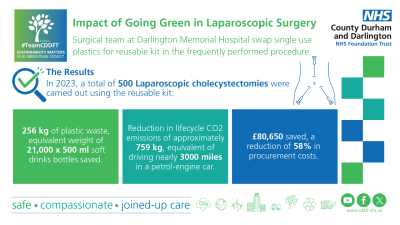The surgery team at Darlington Memorial Hospital is pioneering a sustainable approach to surgery with a successful initiative to reduce waste, carbon emissions, and costs associated with laparoscopic cholecystectomies, a commonly performed procedure to remove the gallbladder.
Operating theatres are among the largest contributors to hospital waste, generating around one-third of the total.
Recognising the environmental challenge, the surgical team at Darlington Memorial Hospital launched a project to minimise the environmental impact of this procedure, aligning with the NHS’s ambitious target of achieving net-zero emissions.
The team examined the single-use equipment traditionally used in laparoscopic cholecystectomies and identified reusable alternatives.
They then developed standardised reusable instrument kits, which were used for all procedures performed by two upper gastrointestinal consultants throughout 2023.
Impressive Results
The results of the project, which covered 500 procedures in 2023, were striking:
- Plastic Waste Reduced: The switch to reusable kits eliminated 256 kg of plastic waste - the equivalent of 21,000 500ml soft drink bottles.
- Lower Carbon Emissions: Greenhouse gas emissions were reduced by 759 kg, comparable to the emissions from driving nearly 3,000 miles in a petrol-engine car.
- Cost Savings: The initiative saved £80,650, reducing procurement costs by an impressive 58%.
- Support for Local Business: The reusable kits were sourced from a North of England-based company committed to reaching net-zero by 2030.

Sustainability Without Compromise
The initiative proved that significant environmental and economic benefits could be achieved without compromising patient care.
The reusable kits performed reliably, and the standardisation process ensured they were seamlessly integrated into surgical routines.
This success story highlights the potential for circular practices to drive change within the NHS, serving as a blueprint for other healthcare providers seeking to reduce their carbon footprint.
This project not only underscores the Trust's dedication to sustainability but also demonstrates that greener healthcare is both achievable and cost-effective.